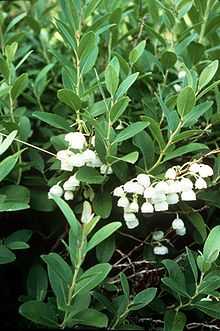Zenobia pulverulenta
From Wikipedia, the free encyclopedia
| Zenobia pulverulenta | |
|---|---|
 | |
| Scientific classification | |
| Kingdom: | Plantae |
| (unranked): | Angiosperms |
| (unranked): | Eudicots |
| (unranked): | Asterids |
| Order: | Ericales |
| Family: | Ericaceae |
| Genus: | Zenobia D.Don |
| Species: | Z. pulverulenta |
| Binomial name | |
| Zenobia pulverulenta (Bartram ex Willd.) Pollard | |
Zenobia pulverulenta, Honeycup, is the sole species in the genus Zenobia, in the flowering plant family Ericaceae. It is native to the Southeastern United States, in North Carolina, South Carolina, and Virginia.
Description
Zenobia pulverulenta is a deciduous or semi-evergreen shrub growing to 0.5-1.8 m tall. The leaves are spirally arranged, ovate to elliptic, 2-7 cm long.
The flowers are white, bell-shaped, 12 mm long and 10 mm broad, and sweetly scented. The fruit is a dry five-valved capsule.
References
- Germplasm Resources Information Network: Zenobia pulverulenta
- USDA Plants Profile: Zenobia pulverulenta
This article is issued from Wikipedia. The text is available under the Creative Commons Attribution/Share Alike; additional terms may apply for the media files.